Musings of a Wine Maven
BARREL TASTING CONTINUES IN FRANCE NOTWITHSTANDING THE ENTENTE CORDIALE
by Jerry Clark
It’s funny how one can misconstrue history, imagining the raison d’être of certain events to be one thing, and then being surprised to learn that reality is quite different. Such was the case when I moved to France in 1988.
At that time, I was vaguely aware of some sort of official agreement between the French and the English termed the Entente Cordiale. At the time I did not realize it was originally a alliance pertaining to political and military relations, rather assuming the document was drafted and accepted (in 1904) to signal a new era of conviviality between two nations that shared a 1,000 year history of dislike, bordering occasionally on hatred, toward one another. Let’s face it, they certainly had a go at each other in North America during the Seven Years’ War.
I had been recruited by an American company that sought to get its products sold in Europe. With the new single market European Union on the horizon, they imagined a “Fortress Europe” solidified trade zone, and wanted in early. Having made business trips throughout Western Europe beginning fifteen years earlier, I highly doubted any economic union would develop quickly given the individual histories of the partners with their neighbors.
I could have begun a new career as a stand up comic just covering the attitudes that emerge—surprisingly quickly—after peeling away a layer or two of the facades each has crafted over time. Let’s see, the Dutch and the Germans, the Finns and the Swedes, the Norwegians and the Danes, and on and on. I had seen first hand the daggers unsheathed after a couple of friendly drinks in a bar. Heck, I think I could do thirty minutes of mirth right now, but I digress.
The new company was going to move my family and me to France, and I was ready for such a change. I thought of the Entente Cordiale. To my knowledge, France and England were the only two nations that had such a cordiality agreement; however, I incorrectly assumed it was executed to portray some kind of band of brothers’ allegiance. How cool was that – not!
In the six years I lived in France, I traveled extensively for business, very often to the United Kingdom. I quickly came to realize that the cordiality gap was still gigantic between these two great allies. And language alone was not the culprit. There is just too much history, going back well before Joan of Arc and continuing into modern times. Consider the relatively recent antics of François Mitterand’s staff when they secretly tested Scotland Yard security by planting bombs outside the French Ambassador’s London residence prior to a State visit. That was just 1984!
I could go on, but this is a wine blog, so I will focus on how the lack of affection between these two distinguished nations manifested itself in their wine trade relations. Have you ever wondered why barrel tasting was a critical part of that trade? It began with the Bordelais.
England likely got its earliest taste for French wines following the marriage of Henri Plantagenet and Eleanor of Aquitaine in 1152. As a result of their union, Bordeaux went under English rule for three centuries. Over time the English became the largest export clients both for Bordeaux and Port.
Everyone seemed to be drinking French wine. In 1663, Samuel Pepys even wrote of “Ho Bryan,” First Growth Chateau Haut Brion, in his famous diary. In 1666, the Bordelais wine became even more readily available when the vineyard owners, the de Pontac family, opened the Pontac’s Head Tavern in the City of London.
Given the size of the trade with France, you would have thought that the major importers in London would be well serviced by the French growers and négociants. Yet concerns of authenticity legitimately existed, as noted in this 1873 advertisement placed in the The Illustrated London News by the London merchant Victoria Wine Company:
Firstly, the Company guarantees that the wines it sells are unadulterated.
Secondly, all long credits are abolished, and cash payments required.
Thirdly, the Company imports its wines, clears them at the docks itself, thus does away with intermediate profits.
Fourthly, the Company uses every appliance for the careful bottling and keeping in condition of the wine it sells.
Fifthly, it delivers free, in London, quantities of not less than a dozen, and
Sixthly, it takes back from the customer any wines or spirits not approved of, returning the money provided the bottles are wrapped.
The great bulk of imported wine came into England in barrels. To ensure authenticity of the wine they purchased, British merchants took precautions. For example, on their annual trips to Bordeaux to taste from barrels at any of the several négociant houses located in the city center, they would return with bottled samples from the chosen barrels so that comparisons could be made once the wine they purchased later arrived in London.
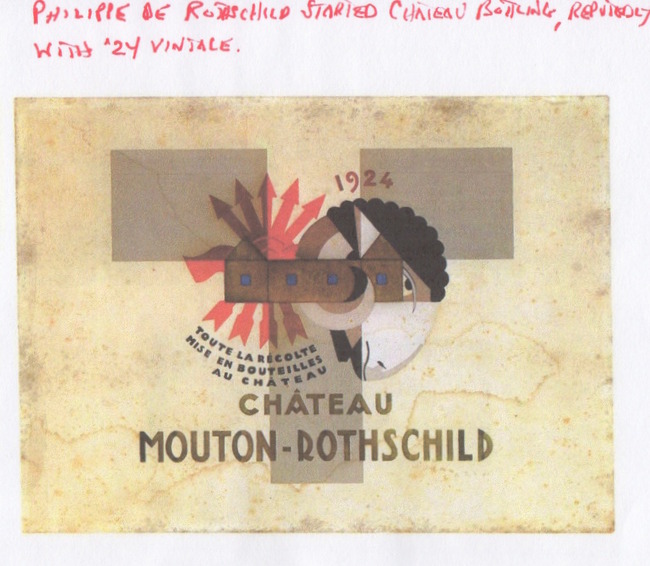
Label of 1924 vintage of Château Mouton-Rothschild. The first year that bottling was made at the Château.
Château bottling in Bordeaux did not begin until 1924 when a 22-year-old Philippe de Rothschild took over the family vineyard, Mouton Rothschild in Pauillac. Determined to take control of their quality offering in the market, he immediately began bottling all his wine at the chateau. Common practice then, among all growers, was to sell each vintage production to a négociant who would receive the wine in barrel and eventually bottle and sell it. If the vintage was thin, certain alterations would be made, such as adding a bit of stronger wine from Algeria, or beet sugar to increase alcohol content (termed chaptalization). An adjunct of château bottling was to print the vintage date and vineyard name on the cork, adding further comfort to consumers. It is thought that the waiter’s practice of first showing the cork upon opening the bottle tableside was to provide verification that the wine was authentic. Inserting a phony cork would be far more difficult that label substitution. Squeezing and sniffing the cork, though important, was secondary.
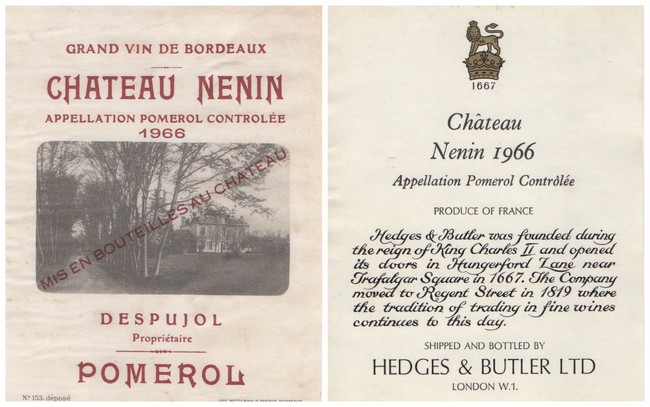
Comparison of label of a 1966 Château Nenin showing the chateau bottled label (left) and Hedges & Butler label (right) for the same wine.
It all came down to trust. The British consumer learned that while he could well be suspicious of what the French were trying to flog, his merchant was all about knowing his product and ensuring reliability of its origins. In my earliest visits to London, I still found English-bottled Bordeaux on the shelves of Berry Bros. and Rudd as well as Hedges & Butler (see labels above).
Today the trust issue is pretty well put to rest—at least on wine—though barrel tasting continues as an early indicator of how the vintage is faring in cask. Robert Parker has often made predictions on quality following barrel tasting.
During each summer visit to Provence, I go to a barrel tasting at the négociant site of Michel Tardieu and his son and winemaker Bastien Tardieu. Though I am not in the wine trade, they graciously welcome me, perhaps confident that I am always on the lookout to find Tardieu-Laurent wine in America to add to my cellar. Their range of more than a dozen wines, all acquired with verbal contracts from Rhône growers, are top examples from the villages they select. This past July, arriving mid-afternoon on a warm day, we limited our tasting to six wines (alas, I don’t spit anything out, so six seemed perfect). My tasting notes follow.
Tasting Notes from Tardieu-Laurent Barrel Tasting, Summer 2015
| White | Red |
|---|---|
2014 Chateauneuf du Pape Blanc
|
2014 Vacqueyras
|
2013 Hermitage Blanc
|
2013 Gigondas Vielles Vignes
|
2013 Chateauneuf du Pape Rouge
|
|
2013 Cotes Rôtie
|
In further discussion with Bastien Tardieu during this visit, he shared his opinion on general quality levels between Northern and Southern Rhône Valley wines from two vintages.
Rhône Valley Wine, Brief Notes from Bastien Tardieu
| North | South | |
|---|---|---|
| 2012 | 3/4 Stars | 4/5 Stars |
| 2013 | 4/5 Stars | 3/4 Stars |
In reflecting on my experience living in France, I still harbor one beef resulting from a shortfall in my expectations of entente cordiale between these two great nations. It surfaced when we enrolled our 6-year-old daughter in an International School in Lyon. All the students had to demonstrate a certain proficiency in a second language after French, from among an offering of four foreign languages. A modicum of instruction was provided in German, Italian, Spanish and English. A special fee was required for those receiving English lessons, but not with the other three foreign languages. There was an accord between France, Germany, Italy and Spain in which the four governments agreed to cover the cost of hiring language teachers for those second languages but, apparently, the UK would not accept this “cordial” arrangement. So, the school in Lyon passed the cost of hiring English instructors on to the parents.
To make matters worse, during the school Christmas party I did not recognize a single carol sung by the English students, and later learned from one teacher that she had been rebuked by the administration for having too much of an American accent. I wrote a broadly satirical teleplay about this experience. But it came back from Monty Python’s London office with a rejection slip indicating, in large red letters, “HARD CHEESE!!”

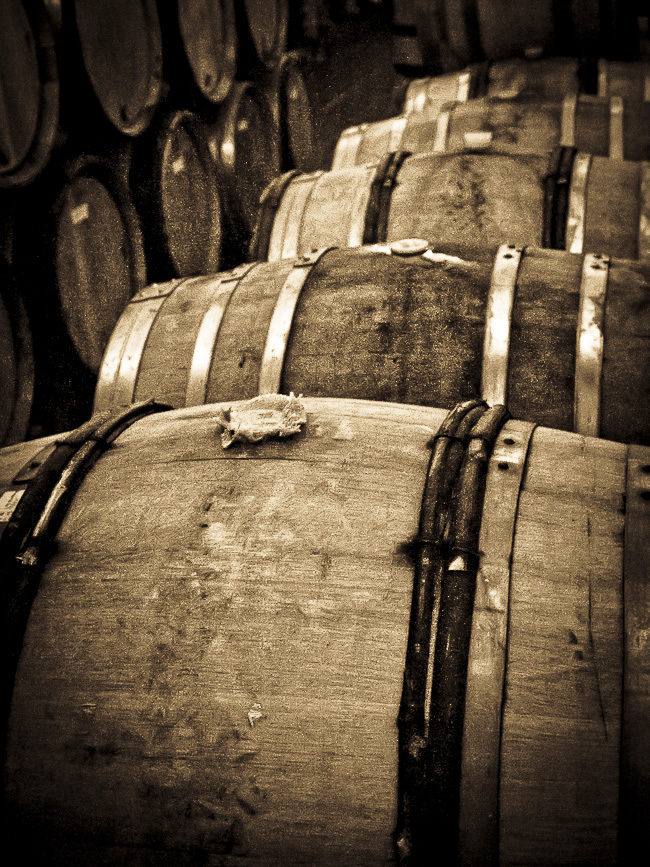
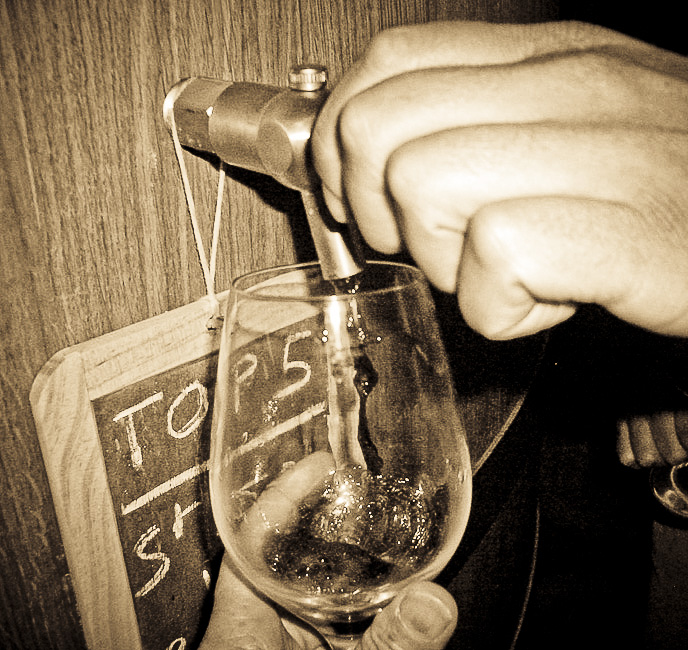
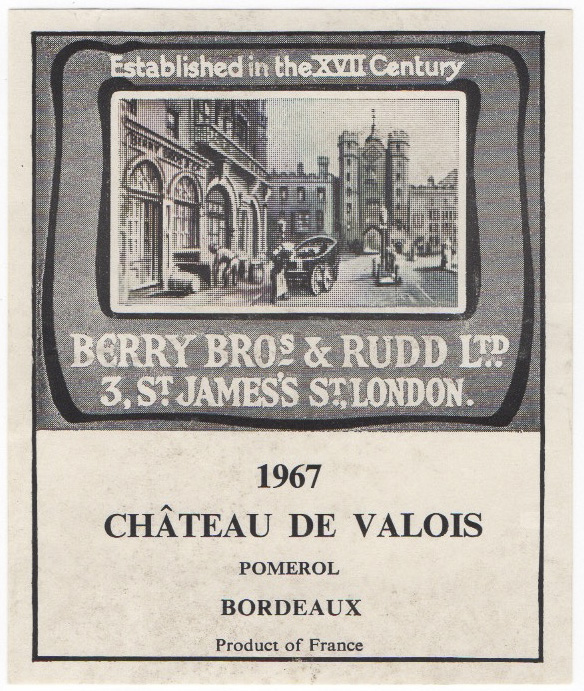
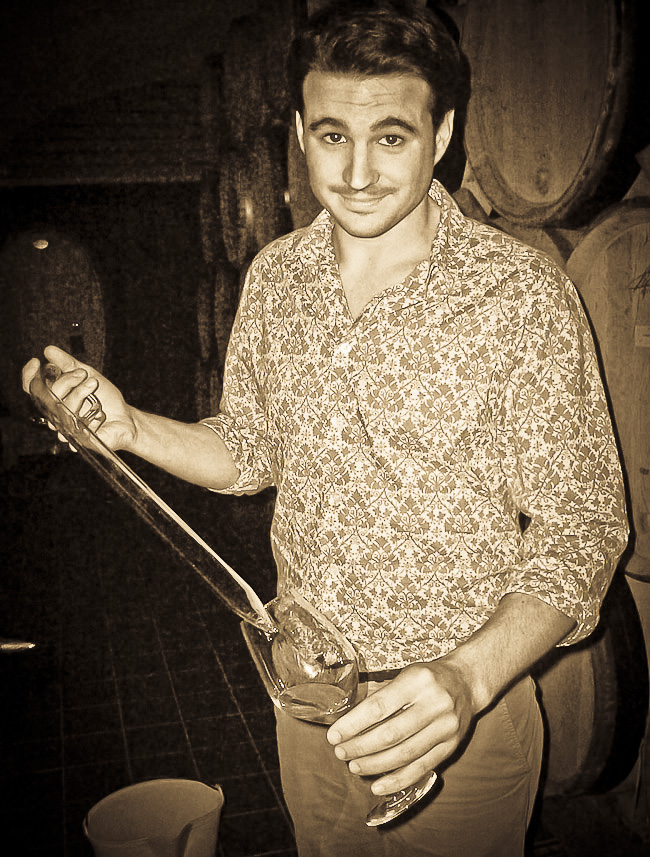
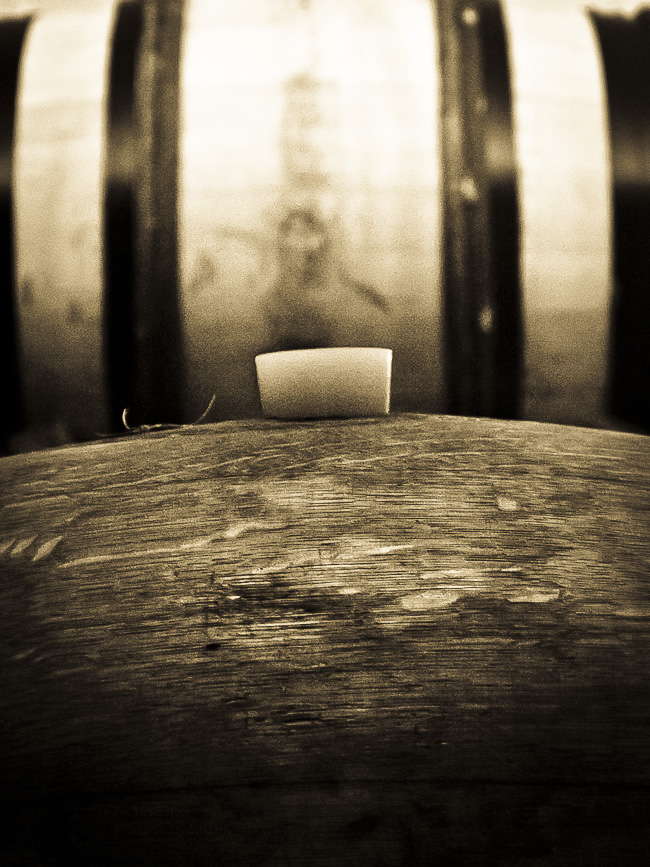
What an interesting article! I had no idea about the provenance of barrel tasting. It makes perfect sense now.
Peter,
I have never gone so far as to try my own bottling. I would be all thumbs for that kind of thing. But my readings tell me the the Brits could order smaller casks from the UK merchant and fill up and lay down directly at home. One of the oddities in my cellar is a 15 liter cask (now empty) of 1983 Nouveau Beaujolais that the renown producer Georges Duboeuf shipped to the US for retail sale.
Jerry
Jerry, Wonderful. Keep the good word flowing. Vintage. Warren
Warren,
While this is a far cry from the printing industry, I love turning closer to tendrils of the vine.
Such a fun and informative article Jerry! And the barrel tasting at Tardieu-Laurent was fabulous – it pays to have friends with influence. Thank you!
Pam,
And thank you for taking those memorable photo’s during the visit.
Jerry
Expecting an article on wine, I learned so much more. History can be so interesting and entertaining, as is wine. A great article. I look forward to future articles written by you, Jerry.
Deirdre,
History and wine are so interconnected, which is likely one of the things that headed me toward wine in the first place. Click on ARCHIVES and see what I dug up on Roman vineyard sites in Gaul (July 10).
Jerry
Jerry – this was a great history lesson, and I would love to hear you do 30 minutes of stand up anytime! I have witnessed some really acrid comments from one country about another, especially the French about the English – so bitter, they are actually funny. I love the 1924 Château Mouton-Rothschild label – that alone made my day!
David,
I guess our regional differences in America would give some insight into cross border culture/conflicts in Europe. It was tough being a Yankee from Rhode Island moving to Texas thirty years ago. Happily I escaped after four years, and the scars have healed.
Jerry
And Jerry, you say nothing about the size of the bottles used by the les negociants. I’ve seen 3+ liter bottles for la Grande Herme, not too many of those suckers from a cask!
Richard
Richard,
Until your post I had cleared away all recollection of our sail off Watch Hill with that huge bottle of Big Herm rolling from side to side. The Portuguese agency that created that products motto (Big Herm is Made From Big Grapes) truly came up with a winner.
Thanks for the memories!
I was actually just telling someone the other day that I was disappointed that I never picked up a British accent from the Lycée.
Not just for my small guest appearance, but I really enjoyed this article. I was pleasantly surprised to find that you somehow managed to locate the appropriate wine labels for your article in the chaos that is your study (or any other black hole at 7 Heath St). What other fun artifacts are you concealing from us? P.S. Mom could use your skills to find your wedding album.
You should know that all things wine related in the house are sacrosanct, thus readily retrievable. Our wedding album has gone missing? Hmmm. I have to think a bit about that.
What a fascinating article! Who knew about all of this history and the way it still influences how things are done. Made me wonder about the smuggling business during those years when French spirits, especially, were lucrative, forbidden goods. Too far afield for this venue? I’d love to know more about that.
Never thought about smuggling, but makes sense that it would have occurred. I will look into this further among my wine books. Your query made me think of an incidence of illicit activity related to booze. The Brits made a lovely small film after the war titled “Tight Little Island.” It was based upon a WWII shipwreck adjacent to a small Scottish island that had drunk through all the Scotch they had on hand. The ships cargo included something like 50,000 cases of Scotch, which the villagers gallantly off-loaded and discretely stored away.
Thank you for the intriguing article Jerry. Having lived in neighbouring Luxembourg for several years I have to say I thoroughly enjoyed the best of both worlds. I find lovely French reds pair very well with Monty Python humour, and still do.
Heidi,
This is amazing. While I never traveled to see Luxembourg while living in Lyon, thus know nothing of it, not one hour before seeing your message tonight I was reading a memoir of a Canadian writer describing his time in Paris in the late twenties. He writes of spending a few days with friends in Luxembourg, and I was taken by this description:
“Around us the conversation was going on either in the softest German or in a dialect that we found out later was the Luxembourger platt, a language that sounded like the passage of water over stones.” Now I am really intrigued to hear it spoken.
I like the backstory…. gives the article “full body.” From my “tasting notes,” I’ll give this a 9.5/10. I’d would have given it a 10, but there is no barrel. Cheers mate!
9.5! I am honored.
Chateauneuf du pape blanc is a favorite of mine, if only because I like to say it out loud. Even with an American accent. Send me a barrel, er I mean bottle.
Claire,
Now thats a nice bottle of white. But also look around for a Viognier. The name has a nice roll to it and the wine can be delicious (more so coming out of France than California).
Great Article Jerry with the benefit of some very interesting history
‘i guess in the end “its all about the wine baby”
Keep up the great work my friend
Bob,
Yeah, I love the stuff. Funny that it never made the unofficial drink list at the ATO toga parties. Guess I have to admit having pagan tastes as a youth.
Interesting! I always feel like it’s a proper tour of a vineyard (and an honour) when I’m allowed to taste straight from the barrel.
Ashley,
You are totally correct about an honor being bestowed when you taste from the barrel. I am always humbled by the pride that’s taken when we taste the results of their labor.
Jerry